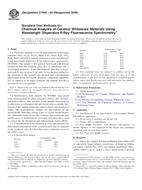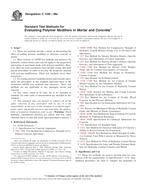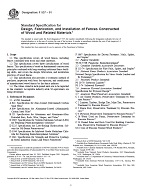1.1 This test method evaluates the flexural performance of toughness parameters derived from fiber-reinforced concrete in terms of areas under the load-deflection curve obtained by testing a simply supported beam under third-point loading.
Note 1-Toughness determined in terms of areas under the load-deflection curve is an indication of the energy absorption capability of the particular test specimen, and, consequently, its magnitude depends directly on the geometrical characteristics of the test specimen and the loading system.
1.2 This test method provides for the determination of a number of ratios called toughness indices that identify the pattern of material behavior up to the selected deflection criteria. These indices are determined by dividing the area under the load-deflection curve up to a specified deflection criterion, by the area up to the deflection at which first crack is deemed to have occurred. Residual strength factors that represent the average post-crack load retained over a specific deflection interval as a percentage of the load at first crack are derived from these indices.
Note 2-Index values may be increased by preferential alignment of fibers parallel to the longitudinal axis of the beam caused by fiber contact with the mold surfaces or by external vibration. However, index values appear to be independent of geometrical specimen and testing variables, such as span length, which do not directly affect fiber alignment.
1.3 This test method provides for the determination of the first-crack flexural strength using the load corresponding to the point on the load-deflection curve defined in 3.1.1 as first crack, and the formula for modulus of rupture given in Test Method C78.
1.4 Values of flexural toughness and first-crack flexural strength stated in inch-pound units are to be regarded as the standard. Values of toughness indices and residual strength factors are independent of the system of units used to measure load and deflection.
1.5 This standard does not purport to address all of the safety concerns, if any, associated with its use. It is the responsibility of the user of this standard to establish appropriate safety and health practices and determine the applicability of regulatory limitations prior to use.
Product Details
- Published:
- 05/01/1997
- Number of Pages:
- 7
- File Size:
- 1 file , 120 KB


